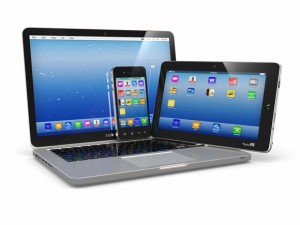Desktop and laptop computers are devices that help people in their everyday tasks and activities. They can do several tasks at once, like surfing the Internet, play high definition video, play music files, open and edit a document, and many more. Computers were originally the only devices that can connect to the Internet. During the first years of the Internet as a military technology, room sized computers across the different military bases within the country were linked together by this technology. As computers shrank in size, from room sized devices to a device that could fit on a typical desktop, the Internet also developed from a military use only technology into a technology that include all businesses and involve the general public.
As more and more people connect to the Internet, technology progressed to produce smaller and smaller devices that are also faster and efficient than their predecessors. Bulky desktop computers shrank into all-in-one desktop PCs wherein the CPU is hidden inside the monitor itself. Larger laptops also shrank in size into netbooks and super thin ultrabooks. New technologies also emerged like smartphones and tablets which are also capable of Internet connectivity. Smartphones are upgraded versions of the typical mobile phone. It has faster processor and larger RAM compared to older phones. Tablets are just like smartphones but it has larger screen and larger storage space. Smartphones are ubiquitous today, because of its features and capabilities.
Portability and Internet connectivity
Smartphones are so portable you can bring it almost everywhere. You can put it in your pocket or stack it in your bag and you are good to go. Its small form factor makes it an ideal device if you are a person that is always on the go. It has the ability to connect to the Internet either via Wi-Fi or 3G/4G/LTE. The 3G/4G/LTE technologies let phone network service providers to offer Internet connectivity to their subscribers as long as they are under their service coverage area. You can now connect to the Internet wherever you may be. You can use the public Wi-Fi connections offered on public places such as restaurants, parks, malls, etc. or you can subscribe to your phone company’s Internet service.
Can do basic computer tasks
As mentioned, smartphones can do basic computer tasks such as connecting to the Internet, playing video files and movies, playing music and audio files, creating and editing documents, and play certain games. Smartphones can do these tasks because of its advanced hardware configuration such as faster processors and larger memory. Most high end smartphones even use quad core processors used in CPUs for multi-tasking and more efficient operation.
Optimized for Internet and video calls
Smartphones are meant for both phone and Internet calls because of its size and form. If you use a computer or laptop for voice calls, you need to install a microphone and headphones first and a web camera for video calls. You don’t need to do these things if you are using a smartphone for Internet calls. Smartphones even have front facing cameras for optimized video calls so that you can be viewed by the other person on the line. Smartphones can also use VoIP (Voice over Internet Protocol) to enable Internet calls, video calls, call forwarding, call blocking, caller ID, teleconferencing, etc. A VoIP service provider, for example RingCentral offers these services at a significantly cheaper price compared to services by a regular phone company.


